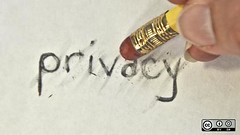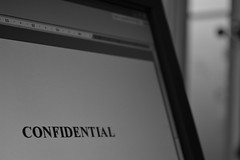 |
| ©http://www.flickr.com/photos/holster/ |
But why is this so important? For many of us, the consequence of unlawful information sharing is that professionals and the LA agree a 'line' about needs and provision which reflects the level and type of provision they are prepared to offer. This affects the child's rights under the Education Act 1996 to have their needs met irrespective of block contracts or what LAs usually give other children.
But unlawful information sharing also undermines our right to control personal information about ourselves and our families. At a the most basic level, it breaches our right to privacy and can make us feel pretty violated and abused.
But unlawful information sharing also undermines our right to control personal information about ourselves and our families. At a the most basic level, it breaches our right to privacy and can make us feel pretty violated and abused.
So what does the law say?
I have tried to pull together here some relevant law and guidance so that you can see that both parent and child do have rights. I have also added copies of the various codes of conduct which are produced by professional bodies as they touch on ethical duties in relation to confidentiality.
If you have doubts about whether public bodies are acting unlawfully, please seek legal advice.
If you have doubts about whether public bodies are acting unlawfully, please seek legal advice.
The Human Rights Act 1998 brings in to force in the UK the rights set out in the European Convention of Human Rights. The rights are set out in Schedule 1 and include Article 8 of the ECHR, the right to privacy. A useful guides Article 8 can be found here and here.
The DPA is exceptionally important in helping to protect your right to privacy as it establishes a set of rules for those who handle your personal data, and gives you a number of rights over that personal data and the way it is handled.
 |
| ©http://www.flickr.com/photos/opensourceway/ |
Important guidance on its use can be found on the Information Commissioner's website. Liberty also has some useful information on its site.
It should be noted that the DPA is different to the Freedom of Information Act which doesn't concern personal information but allows the public to access information held by public bodies, e.g. policies, records of meetings etc.
ICO's Data Sharing Code of Practice
The Data Sharing Code of Practice concerns "different types of disclosure, often involving many organisations and very complex information chains". It provides a framework for organisations to make good quality decisions about data sharing.
How many LAs have read this do you think? How many apply it?
The Common Law Duty of Confidentiality
Common law is not written out in one document like an Act of Parliament. It is a form of law based on previous court cases decided by judges; hence, it is also referred to as ‘judge-made’ or case law. The law is applied by reference to those previous cases, so common law is also said to be based on precedent.
How many LAs have read this do you think? How many apply it?
The Common Law Duty of Confidentiality
Common law is not written out in one document like an Act of Parliament. It is a form of law based on previous court cases decided by judges; hence, it is also referred to as ‘judge-made’ or case law. The law is applied by reference to those previous cases, so common law is also said to be based on precedent.
The general position is that if information is given in circumstances where it is expected that a duty of confidence applies, that information cannot normally be disclosed without the information provider’s consent.
NHS Confidentiality: Code of Practice
The Confidentiality Code of Practice sets out clear guidelines about the use of personal information and confirms that NHS staff must also consider their duties under the common law regarding confidential information.
NHS Constitution
 |
| ©http://www.flickr.com/photos/highersights/ |
It deals with your right to request your own confidential information and the need to respect privacy.
Royal College of Speech and Language Therapy: Communicating Quality 3
This document sets out best practice guidance for all speech and language therapists. It comments on confidentiality at 1.7.6. The Code of Ethics and professional conduct ate at 1.6.
Sadly, the RCSLT's guidelines on the SEN process do not make any mention of their professional duties of confidentiality or the DPA. I have raised this issue with them but they seem to think that having sent the document to Tribunal panel members was the same as obtaining legal advice on privacy issues. Er, no....They are, however, soon consulting on a new draft and I have offered to be involved. It has all gone very quiet since. Was it something I said?
The Health Professionals Council
The HPC has its own guide to the professional conduct of SLTs and a guide for occupational therapists.
Royal College of Speech and Language Therapy: Communicating Quality 3
This document sets out best practice guidance for all speech and language therapists. It comments on confidentiality at 1.7.6. The Code of Ethics and professional conduct ate at 1.6.
Sadly, the RCSLT's guidelines on the SEN process do not make any mention of their professional duties of confidentiality or the DPA. I have raised this issue with them but they seem to think that having sent the document to Tribunal panel members was the same as obtaining legal advice on privacy issues. Er, no....They are, however, soon consulting on a new draft and I have offered to be involved. It has all gone very quiet since. Was it something I said?
The Health Professionals Council
The HPC has its own guide to the professional conduct of SLTs and a guide for occupational therapists.
Code of Ethics and Professional Conduct for Occupational Therapists
The Code is found here. Confidentiality is found at p.11. Record keeping duties are set out here.
Guidelines for Professional Practice in Educational Psychology
The guidelines for Educational Psychologists and confidentiality issues are dealt with at 2.3.
The Code is found here. Confidentiality is found at p.11. Record keeping duties are set out here.
Guidelines for Professional Practice in Educational Psychology
The guidelines for Educational Psychologists and confidentiality issues are dealt with at 2.3.
No comments:
Post a Comment